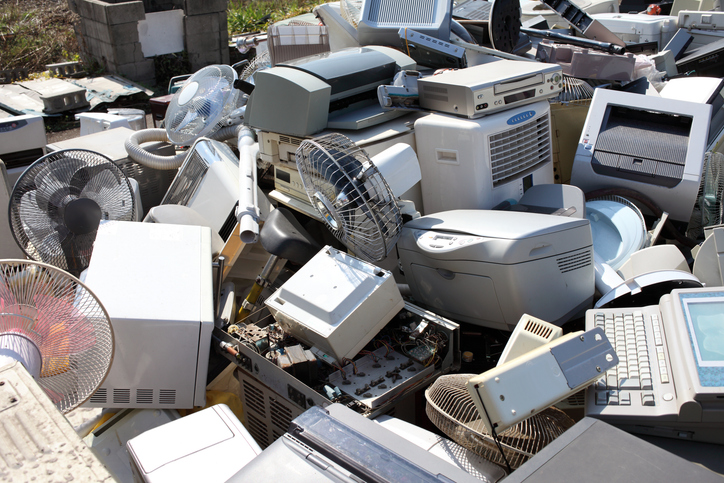Even if they are technically out of commission, older electronics have the potential to cause some damage. Because older devices sometimes contain lead, mercury, and other potentially hazardous materials, your obsolete electronics can’t go straight to the landfill. Massachusetts electronics recycling regulations target a few specific components that might be found in some of your older devices. It’s easy to remain in compliance with those regulations as long as you always follow best practices for recycling electronic waste.
Materials Covered by Massachusetts Electronic Recycling Regulations
As you may know, the Massachusetts Department of Environmental Protection (MassDEP) enforces a number of waste bans. They generally apply to both individuals and businesses/organizations located in Massachusetts. (With the exception of the commercial food waste ban, which only applies to organizations.) Any material that is covered by a waste ban needs to be recycled or disposed of in some other specific way. MassDEP can issue fines for non-compliance if banned materials are thrown away.
As for disposing of older electronics, only three materials currently covered by waste bans may be relevant:
- Cathode Ray Tubes
Massachusetts recycling regulations have banned cathode ray tubes (CRTs) from the trash for decades now. CRTs were a standard component of televisions and computer monitors until flat-screen technology evolved and made bulky CRT TVs and monitors largely obsolete. Once people started dumping these old devices, disposal became a safety issue because cathode ray tubes contain lead. Old CRT TVs and computer monitors thrown into landfills could break apart and leech lead into the environment. So, MassDEP banned them from the trash.
If you have any bulky TVs or computer monitors dating back to the mid-2000s or earlier, it’s likely they contain cathode ray tubes. These devices may be recycled through a municipal e-waste collection event, through electronics retailers like Best Buy, or through other electronics recyclers.
- Mercury
Mercury could be inside some of your older electronics; specifically, TVs made before 1991, or TVs/computer monitors with LCD screens. Certain older laptops also contain mercury in the switch that wakes up the screen when the laptop is opened.
These electronics should be perfectly safe to handle when they’re intact because the mercury should be sealed up inside, but any devices that might hold mercury should still be treated as hazardous waste when disposing of them.
- Batteries
It’s pretty unlikely that any lead acid batteries are hiding inside your older devices. They aren’t commonly used in any standard household or office electronics, but could be found in things like home alarm systems, mobility scooters, lawnmowers, and generators. Lead acid batteries may be returned to battery retailers or at a hazardous waste collection site.
Are There Massachusetts Recycling Regulations About Other E-Waste?
About half of U.S. states have passed laws requiring that electronic waste is recycled, but Massachusetts has not. Technically businesses and other organizations can throw away electronic devices as long as they don’t contain CRTs or mercury, without violating any Massachusetts recycling regulations.
However, throwing away your old electronics could be a violation of data disposal regulations if they’re devices that are capable of storing sensitive data. Massachusetts law requires businesses and organizations to dispose of private data belonging to Massachusetts residents using permanent destruction methods like shredding or burning. Other regulatory bodies like HIPAA and FINRA impose strict data destruction requirements on organizations that have access to private healthcare or financial data.
Here’s the bottom line: All your older electronics should be turned over to a recycler (unless they contain hazardous materials). Any electronic device that could store private data will need to have its memory removed and shredded. Meanwhile, the rest of the device needs to be safely recycled. Miller Recycling works with our sister company, Northeast Data Destruction, to shred hard drives and other sensitive materials while we safely recycle the electronics the plastic, metal, and other recyclable components of old devices.
Are You in Compliance with Massachusetts Electronics Recycling Regulations?
Miller Recycling takes all the guesswork out of recycling. Our customers know they can count on us to manage their recyclable waste responsibly and in compliance with all Massachusetts electronics recycling regulations. I’m happy to answer any questions about what that might look like for your organization. Contact me today.


